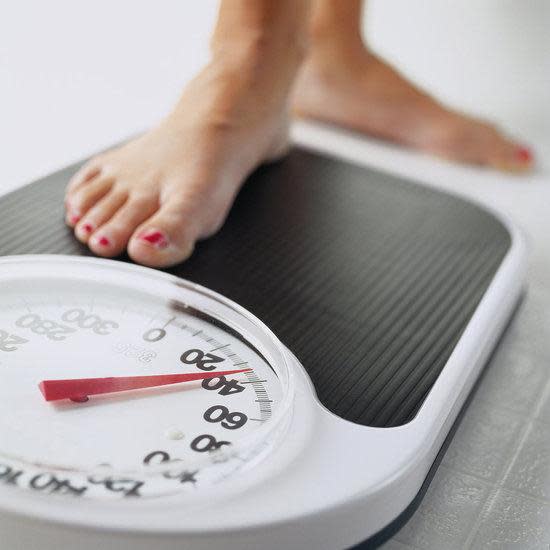The Dreaded Weight-Loss Plateau Explained

Question: In March of 2011, I went from meat eater to vegan overnight. Now, I feel incredibly good, my skin glows, and living cruelty-free makes everything so much better. Also, I already lost a fair amount of weight. But since making the transition, I seem to be "stuck" at 65 kg (at 1.64 m) and nothing helps! I work out, don't eat sugar (and no alcohol/coffee) and live mostly on fruits and veggies. Of course, I also keep a close watch at my fat intake. Any thoughts or tips about what's going on?
Laura Estévez Zelf
Answer: While it might be a good idea to see a nutritionist and find out what might be going on inside that little body of yours, you could be experiencing something called a weight-loss plateau. I like to call it "the bane of my existence."
A weight-loss plateau occurs when you stop losing weight despite continuing with your normal exercise routine and maintaining healthy-eating habits. This happens to everyone trying to lose pounds, and often comes as a shock to those who believe that if they just continue to follow a low-calorie diet, they will continue to get skinnier. Sorry, not the case. Unfortunately, even well-thought-out weight loss plans hit a roadblock.
Why is this happening?
The evolution from weight loss awesomeness to a plateau often follows a pretty typical pattern.
In the beginning, you're losing weight and everything is cotton candy and sunshine. When you start consuming less calories, your body gets its energy by releasing glycogen, a carbohydrate found in the muscles and liver. Glycogen retains a lot of water, so when you burn it off, it releases all that water - about 4 grams of water for every gram of glycogen. So, most of the weight loss you experience comes from shedding water weight.
Water weight isn't the only factor - you can also blame metabolism. When you lose weight, you lose fat and lean tissue - the latter of which also slows down your metabolism. Now, your efforts to lose weight are in sync with your metabolism, so in order to shed more, you need to change a few things …again.
The answer lies in increasing your activity or lowering your calorie intake even more, utilizing the same approach that you started with.
Here are some tips for crossing the bridge and getting over the plateau:
Take a look at your habits. Is it possible you've loosened your rules over the past few months? We all start out strong, but it's a bit tough to maintain a healthy regimen. More often than not, weight-loss plateaus are caused by overeating. Make sure you're not consuming larger portions or getting less exercise just because you're busy.
Keep a food diary. Track the time of day you are eating, what you ate, and even the emotions that you felt before eating. This could help you discover not only dietary roadblocks, but also the emotions that cause you to overeat. Once you recognize these "food triggers," you can start to find better alternatives to manage your ups and downs. Reward yourself for success with a massage or a salon blow-dry every few weeks to keep yourself feeling good about your progress.
Cut calories …again. Cut your daily intake by 150 to 200 calories, granted you're not dipping below the 1,200-calorie mark. Getting fewer than 1,200 calories a day isn't healthy, kiddo. Not getting enough calories can actually increase your hunger pains and up your risk of binging.
Kick up your workout routine. Nobody is advising you to turn into G.I. Jane, but consider increasing the amount of time you workout every week or the intensity. Even an additional 15 to 30 minutes a week could do the trick. If that's not an option, just think outside the box by walking to lunch instead of getting behind the wheel, or cleaning your place over hiring a maid.
Get more protein. Studies show that protein may help keep hunger at bay. Protein foods actually suppress ghrelin, a hormone that your stomach releases that triggers your appetite. Carbs, on the other hand, make people feel hungrier than they were before eating. Be careful not to go overboard though - protein should only take up 20 percent of your daily calorie intake.
Change it up. Sometimes you just need some variety. Switch it up by finding alternative healthy, low-calorie meals and changing up your workouts to reinvigorate. This might just help you get out of a weight-loss rut.
Ask yourself if it's worth it. Do you feel good? Then who the hell cares if you've stopped losing weight? Ask yourself if putting in the extra work is worth all the time and energy. If the answer is "no," instead, turn your attention toward staying in shape and keeping the pounds off, rather than losing more. Remember, you have to appreciate the skin you're in.
